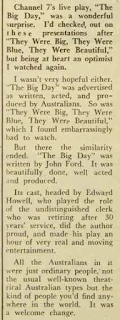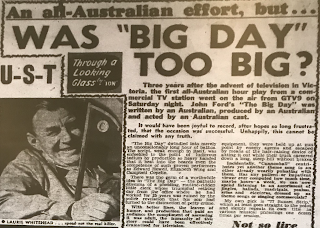It was the first hour of drama made for commercial Australian TV which
was written and produced by an Australian with an all Australian cast. (Though They Were Big, They Were Blue, They Were Beautiful had been a comedy.)
Premise
The last day at work of Hector Skeats, a costing clerk in a city office,
who is retiring after many years. He is a father of two, a girl in her
early twenties and a boy in his late teens. When his retirement is
officially recognised by his boss, his son is arrested for stealing a
car.
Cast
- Edward Howell as Horace Skeats
- Elizabeth Wing as Mrs Skeats
- Don Battye as his son
- Roslyn De Winter as their daughter
- Syd Conabere as Clarrie
- Tony Brown
- Dudley Burton
- John Morgan
- Frank Rich
- Lloyd Cunningham
Production
The play was written by John Ford, a Sydney journalist. At the time of writing he worked in public relations at Qantas. He went on to become an adviser for Whitlam.
It was the second original Australian episode of Shell Presents, following They Were Big, They Were Blue, They Were Beautiful. That play had come third in a Shell-sponsored competition for new Australian TV plays.
Ford wrote The Big Day
for this competition but was unable to submit it in time. However it
was picked up for production. His writing style was compared with Paddy Chayefsky but Ford said, "I wasn't conscious of writing in any particular style
when I started the play. All I have tried to do is portray a day in the
life of an extremely ordinary little bloke, the kind of person who lives
a dull existence from one week to the next."
It involved a cast of ten.
Reception
When the play screened, viewers called with their congratulations, jamming the switchboard for half an hour.
The TV critic for The Age said Howell's casting "was the vital factor in making the drama the best yet presented in commercial series."
The TV critic for the Woman's Weekly called it
"beautifully done, well acted and produced... an hour of very real and
moving entertainment. All the Australians in it were just ordinary
people, not the usual well-known theatrical Australian types but the
kind of people you'd find any- where in the world."
The critic for the Sydney Morning Herald thought the play demonstrated "television 's ability to make dramatic entertainment of
undramatic people and events... except for about 45 seconds of gross
overstatement in the middle of the play, and a sentimental twist at the
end which weakens its main argument" the main conflict was "cleverly
conducted and neatly contrived". He thought Kinnear's "direction was
generally efficient, and, in one or two scenes and the opening
documentary titles, more imaginative than in some previous unlively live
productions."
Valda Marshall of the same paper said the play was "exactly right
for the living room atmosphere of TV viewing" and praised the direction
and acting.
Marshall liked the play so much that two years later she said it "has
remained pretty much par for the course for Australian TV drama ever
since".
Frank Thring in TV Week four his performance moving.
Listener In TV called it "an unconscionably long hour of bathos".
Ford later sold the play to Italian and British TV.
 |
| Stills |
 |
|
 |
|
 |
|
 |
|
 |
|
 |
|
 |
|
 |
|
 |
|
 |
|

 |
|
Whitlam adviser and high-flyer
SMH
January 12, 2007 — 11.00am
JOHN FORD, a man of many talents, was in his colourful lifetime a bank teller, journalist, aviation executive, author and playwright, ministerial adviser and government publicist. Delivering the eulogy at his funeral in Sydney, the former prime minister Paul Keating said Ford had spent significant years of his life working towards a just and fair Australia, and had made a major contribution to the understanding of transport and communications in Australia and overseas.
Keating also recalled how the impeccably dressed Ford brought a touch of sartorial elegance to the office of the roughly hewn Charlie Jones, a former lord mayor of Newcastle and minister for transport in the Whitlam government.
Barry Galton, a journalist, historian and former protege of Ford, wrote in an obituary for The Gold Coast Bulletin that Jones always told friends Whitlam probably would not have lost government in 1975 if he had listened to advisers such as Ford.
Ford later worked as deputy head of the National Media Liaison Service in the Hawke government. Under Mick Young, the special minister of state, the unit had 23 journalists and ancillary staff around Australia.
John Ford, who died from cancer, was born in Gunnedah, the son of Geoff, a roving bank teller, and Doris Thelma. His education was scattered through high schools in Armidale, Tenterfield and Grafton. He left school to follow in his father’s footsteps but entered journalism as a cadet with The Newcastle Herald.
Advertisement
He made a name for himself as the aviation roundsman for the Daily Mirror in Sydney, which led to his next job, as the public relations representative for British Commonwealth Pacific Airlines. John Ulm, the son of the aviation pioneer Charles Ulm, hired Ford to join Qantas in 1957, as press and information officer.
Ford helped promote the first jet services to Australia and later worked for the airline in Europe. He wrote some of the early Qantas histories, now in the Qantas museum archives in Longreach, Queensland. His published works include the novel Honourable Members; The Tokyo Contract, about aircraft sales; his Shell Award-winning play The Big Day; and a novel, The Blue Comedian, widely assumed to be about Tony Hancock. Copies of the book, published in Britain, arrived in Australia the day that Hancock’s death in Sydney by suicide made headline news. Ford was the foundation secretary of the Australian Writers Guild, later the Australian Society of Authors.
His first wife, Joan, died in England in the mid-1970s. He later married Di Godfrey, whom he met in Canberra. In retirement in Balmain, Ford and his miniature fox terrier, Henry, were popular with the local children, who would have Henry fetch the ball in one of the parks.
Advertisement
Ford is survived by Di, sons Hugh and Richard, and daughter Frances.
Gary Scully
 |
| LITV |
 |
NLA Noonan
|
 |
NLA Noonan
|
 |
NLA Noonan
|
 |
NLA noonan
|
 |
| Nla Noonan |
|
 |
NLA Noonan
|
 |
NLA Noonan
|













































No comments:
Post a Comment